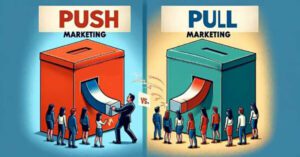What are the best marketing books? Top marketing books include ‘Influence’ by R. Cialdini, ‘Made to Stick’ by Chip & Dan Heath, and ‘Contagious’ by Jonah Berger.
Marketing is an ever-evolving field, and it can be challenging to stay up-to-date with the latest trends and strategies. Fortunately, there are countless best marketing books available that can help professionals of all levels improve their skills and knowledge. From essential marketing principles to innovative theories and emerging trends, there is a wealth of information available in these books.

One of the best things about the best marketing books is that they cover a wide range of topics, making them suitable for professionals in different industries and at different stages of their careers. Some books focus on strategic planning, while others delve into digital marketing dynamics or explore influential marketing theories. Regardless of your specific interests, there is sure to be a book out there that can help you improve your marketing skills.
If you’re looking to expand your knowledge of marketing, reading books is an excellent place to start. Not only can they provide valuable insights and strategies, but they can also help you stay up-to-date with the latest trends and best practices. So, whether you’re a seasoned marketing professional or just starting out, consider adding some of these best marketing books to your reading list.
Key Takeaways
- The best marketing books cover a wide range of topics, making them suitable for professionals in different industries and at different stages of their careers.
- Reading the best marketing books can provide valuable insights and strategies, as well as help you stay up-to-date with the latest trends and best practices.
- Consider adding some of the best marketing books to your reading list to expand your knowledge and improve your skills.
Essential Marketing Principles

Understanding Marketing
Marketing is the process of identifying, anticipating, and satisfying customer needs and wants through the creation, promotion, and distribution of goods and services. It involves understanding the customer, creating a product or service that meets their needs, and promoting it effectively to reach the target audience.
To be successful in marketing, it is important to have a deep understanding of the customer, including their needs, wants, and preferences. This can be achieved through market research, which involves gathering and analyzing data about the target audience.
The Role of Advertising
Advertising is a key component of marketing that involves promoting a product or service through various channels such as print, television, radio, and online media. The goal of advertising is to create awareness and interest in the product or service, and ultimately drive sales.
Effective advertising requires a clear understanding of the target audience and their preferences. It also involves creating a compelling message that resonates with the audience and motivates them to take action.
Sales and Marketing Synergy
Sales and marketing are closely related and work together to achieve the same goal: driving revenue. Marketing creates awareness and interest in the product or service, while sales converts that interest into actual sales.
To be successful, it is important for sales and marketing teams to work together and share information. Marketing can provide valuable insights into the customer, while sales can provide feedback on what is working and what is not.
In conclusion, understanding the principles of marketing is essential for any business looking to succeed. By understanding the customer, creating a compelling message, and working together as a team, businesses can effectively promote their products and services and drive revenue. For more information on marketing principles, check out this resource, which provides a comprehensive overview of the topic.
Strategic Marketing Planning

Developing a Marketing Strategy
Developing a marketing strategy is the first step towards achieving success in any marketing campaign. It involves identifying the target market, analyzing the competition, and determining the unique selling proposition of the product or service. A well-defined marketing strategy helps in aligning the marketing efforts with business objectives and ensures a higher return on investment.
To develop a marketing strategy, businesses can use various frameworks such as SWOT analysis, Porter’s Five Forces, and PEST analysis. These frameworks help in identifying the internal and external factors that affect the business and provide insights into the market trends, customer behavior, and competitive landscape.
Creating a Marketing Plan
Once the marketing strategy is in place, the next step is to create a marketing plan. A marketing plan outlines the tactics and activities that will be used to achieve the marketing objectives. It includes the budget, timeline, and metrics for measuring the success of the marketing campaign.
A well-crafted marketing plan considers the target audience, marketing channels, messaging, and branding. It also takes into account the resources available and the constraints that may impact the execution of the plan.
Leveraging Online Marketing
Online marketing has become an integral part of any marketing campaign. With the rise of social media and e-commerce, businesses can reach a wider audience and engage with customers in real-time. Online marketing includes various tactics such as search engine optimization, social media marketing, email marketing, and content marketing.
To leverage online marketing, businesses need to have a strong online presence and a clear understanding of their target audience. They should also keep up-to-date with the latest trends and technologies in the online marketing space.
For more information on strategic marketing planning and the best marketing books, check out this resource by Forbes Agency Council.
Digital Marketing Dynamics

Digital marketing has revolutionized the way businesses reach out to their customers. With the advent of social media, email marketing, and search engine optimization (SEO), businesses can now target their audience with greater precision and effectiveness. In this section, we will explore the key dynamics of digital marketing and how they can be used to drive business growth.
SEO and Content Marketing
SEO and content marketing are two essential components of digital marketing. SEO involves optimizing your website and content to rank higher on search engine results pages (SERPs). Content marketing, on the other hand, involves creating and sharing valuable content that attracts and engages your target audience.
To succeed in SEO and content marketing, businesses need to understand their target audience and create content that resonates with them. They also need to stay up-to-date with the latest SEO best practices and algorithms. A great resource for staying up-to-date with SEO is Moz, a website that provides comprehensive SEO tools and resources.
Social Media Marketing
Social media marketing is another crucial aspect of digital marketing. With billions of people using social media platforms like Facebook, Twitter, and Instagram, businesses can reach a vast audience with their marketing messages. Social media marketing involves creating and sharing content on social media platforms to engage with customers and drive traffic to your website.
To succeed in social media marketing, businesses need to understand their target audience and create content that resonates with them. They also need to stay up-to-date with the latest social media trends and algorithms. A great resource for staying up-to-date with social media is Hootsuite, a website that provides comprehensive social media management tools and resources.
Email Marketing and More
Email marketing is another essential component of digital marketing. It involves sending targeted emails to your customers to promote your products and services. Email marketing can be highly effective when done right, but businesses need to be careful not to spam their customers with irrelevant or unwanted emails.
In addition to SEO, content marketing, social media marketing, and email marketing, there are many other aspects of digital marketing, such as pay-per-click (PPC) advertising, affiliate marketing, and influencer marketing. To succeed in digital marketing, businesses need to stay up-to-date with the latest trends and best practices in all of these areas.
In conclusion, digital marketing is a complex and ever-evolving field, but businesses that understand its dynamics and stay up-to-date with the latest trends and best practices can reap significant rewards. By leveraging the power of SEO, content marketing, social media marketing, email marketing, and other digital marketing strategies, businesses can reach their target audience with greater precision and effectiveness than ever before by writing the best marketing books.
The Best Marketing Books On Tactics and Techniques
Growth Hacking Essentials
Growth hacking is the process of experimenting with various marketing tactics and techniques to identify the most effective ones for a specific product or service. It involves a combination of creativity, data analysis, and strategic thinking to achieve rapid growth.
One of the most important growth hacking tactics is to identify and optimize the key metrics that drive growth. This involves analyzing data to understand user behavior and identify areas for improvement. By focusing on the metrics that matter most, growth hackers can make data-driven decisions that lead to significant growth.
Another key growth hacking technique is to leverage social media and other online platforms to reach a wider audience. This can involve creating engaging content, running targeted ads, and building a strong online community.
The Art of Copywriting
Copywriting is the art of crafting persuasive and compelling messages that motivate people to take action. Effective copywriting can make a significant difference in the success of a marketing campaign.
One of the most important aspects of copywriting is understanding the target audience. By understanding their needs, desires, and pain points, copywriters can create messages that resonate with them and motivate them to take action.
Another important aspect of copywriting is creating a sense of urgency. By emphasizing the benefits of taking action now, copywriters can encourage people to act quickly and decisively.
Data-Driven Marketing
Data-driven marketing is the process of using data to inform marketing decisions and strategies. By analyzing data on consumer behavior, preferences, and trends, marketers can make informed decisions that lead to more effective campaigns.
One of the most important aspects of data-driven marketing is identifying the right data to analyze. By focusing on the metrics that matter most, marketers can gain valuable insights into consumer behavior and preferences.
Another key aspect of data-driven marketing is using automation and personalization to deliver targeted messages to specific audiences. By leveraging data to create personalized messages, marketers can increase engagement and drive conversions.
For more information on data-driven marketing and the best marketing books, check out this article from Forbes.
Influential Marketing Theories

Permission Marketing Fundamentals
Permission marketing is a marketing technique that involves obtaining the consent of potential customers before sending them promotional messages. The concept was introduced by Seth Godin in his book “Permission Marketing: Turning Strangers into Friends and Friends into Customers.”
The idea behind permission marketing is that by obtaining permission, companies can avoid interrupting potential customers with unwanted marketing messages. Instead, they can build relationships with customers by providing them with relevant and valuable information. This approach can lead to more effective marketing campaigns, higher customer satisfaction, and increased customer loyalty.
To implement permission marketing, companies need to offer something of value to potential customers in exchange for their permission to send them promotional messages. This could be in the form of a free e-book, a discount coupon, or access to exclusive content. Once permission is obtained, companies can send targeted and personalized messages to customers based on their interests and preferences.
The Power of Storytelling
Storytelling is a powerful marketing tool that can help companies connect with their customers on an emotional level. By telling compelling stories, companies can create a strong brand identity, build trust with customers, and differentiate themselves from competitors.
Effective storytelling involves understanding the needs and desires of customers and crafting a narrative that resonates with them. This could involve telling stories about the company’s history, its values, or the experiences of its customers. By using vivid language, imagery, and emotion, companies can create stories that capture the attention of customers and leave a lasting impression.
To use storytelling effectively, companies need to identify the key themes and messages that they want to convey and then craft stories that support those messages. They also need to ensure that their stories are authentic and aligned with their brand identity.
Positioning and Branding
Positioning and branding are essential components of any successful marketing strategy. Positioning involves defining the unique value proposition of a product or service and communicating it to customers. Branding involves creating a strong and recognizable brand identity that resonates with customers.
Effective positioning involves identifying the key benefits of a product or service and communicating them in a way that differentiates it from competitors. This could involve highlighting unique features, emphasizing quality or convenience, or targeting specific customer segments.
Branding involves creating a distinct and memorable brand identity that reflects the values and personality of the company. This could involve developing a logo, choosing a color palette, or creating a tagline. By creating a strong brand identity, companies can build trust with customers and create a sense of loyalty and affinity.
Overall, these influential marketing theories can help companies develop more effective and targeted marketing campaigns. By understanding the needs and desires of customers and crafting compelling narratives, companies can build strong relationships with their customers and differentiate themselves from competitors.
For more information on these topics and the best marketing books, check out Marketing Theories.
Behavioral Insights in Marketing
Consumer Behavior Analysis
Understanding consumer behavior is a crucial aspect of marketing. By analyzing consumer behavior, marketers can tailor their strategies to meet the needs and desires of their target audience. Consumer behavior analysis involves studying the factors that influence consumer decision-making, including cultural, social, personal, and psychological factors.
According to a recent study by Nielsen, the psychology of consumer behavior is complex and multifaceted. Consumers are influenced by a wide range of factors, including their emotions, beliefs, and attitudes. By understanding these factors, marketers can create more effective marketing campaigns that resonate with their target audience.
Psychology of Persuasion
The psychology of persuasion is another important aspect of marketing. Persuasion involves convincing consumers to take a particular action, such as making a purchase or signing up for a service. According to Robert Cialdini, there are six key principles of persuasion: reciprocity, commitment and consistency, social proof, liking, authority, and scarcity.
Marketers can use these principles to create more persuasive marketing campaigns. For example, by offering a free trial or sample, marketers can trigger the principle of reciprocity and encourage consumers to make a purchase. By highlighting social proof, such as customer reviews or testimonials, marketers can build trust with their target audience and increase the likelihood of a sale.
Creating Viral Content
Creating viral content is a goal for many marketers, as it can lead to increased brand awareness and engagement. However, creating viral content is easier said than done. According to Jonah Berger, author of “Contagious: Why Things Catch On,” there are six key factors that contribute to virality: social currency, triggers, emotion, public, practical value, and stories.
By incorporating these factors into their marketing campaigns, marketers can increase the likelihood of creating viral content. For example, by creating content that is shareable and provides practical value to the consumer, marketers can increase the chances of their content going viral.
In conclusion, understanding consumer behavior and the psychology of persuasion are crucial aspects of marketing. By using these insights to create more effective marketing campaigns, the best marketing books and incorporating the factors of virality, marketers can increase brand awareness and engagement.
Innovative Marketing Authors
When it comes to marketing, there are a few authors who have truly made a mark in the industry with their innovative ideas and insights. In this section, we will take a closer look at some of the most influential marketing authors of our time.
Seth Godin’s Marketing Vision
Seth Godin is a renowned marketing expert and author of several best-selling books, including “Purple Cow” and “All Marketers Are Liars”. He is known for his unique vision of marketing, which emphasizes the importance of standing out and being remarkable. Godin’s ideas have inspired countless marketers around the world, and his blog is a must-read for anyone interested in the latest trends and insights in the industry.
The Insights of Al Ries and Jack Trout
Al Ries and Jack Trout are the authors of the classic book “Positioning: The Battle for Your Mind”, which is still considered one of the best marketing books ever written. Their insights on brand positioning and differentiation have helped countless businesses succeed in a crowded marketplace. Ries and Trout’s ideas have stood the test of time and continue to be relevant today.
Contemporary Voices in Marketing
In addition to the established marketing gurus, there are also many contemporary voices in the industry who are making waves with their fresh perspectives and innovative ideas. Some of the most notable include:
- Jonah Berger, author of “Contagious: Why Things Catch On”, which explores the science behind viral content and marketing.
- Nir Eyal, author of “Hooked: How to Build Habit-Forming Products”, which offers a framework for creating products that people can’t put down.
- Allan Dib, author of “The 1-Page Marketing Plan”, which provides a simple yet effective approach to marketing planning.
- Joe Pulizzi, founder of the Content Marketing Institute and author of “Epic Content Marketing”, which outlines a strategy for creating content that drives business results.
- Sean Ellis and Morgan Brown, authors of “Hacking Growth”, which offers a framework for accelerating business growth through experimentation and optimization.
These authors and many others are pushing the boundaries of marketing and challenging traditional thinking in the industry. By staying up-to-date on the latest insights and trends, marketers can gain a competitive edge and drive better results for their businesses.
For more information on the best marketing books and authors, check out this list on Goodreads, which includes recommendations from industry experts and thought leaders.
Building Successful Marketing Campaigns

Successful marketing campaigns are essential for businesses to grow and thrive. Building a successful marketing campaign requires careful planning and execution. In this section, we will explore the key components of a successful marketing campaign and provide examples of how to craft a compelling marketing message, explore ad examples, and measure marketing success.
Crafting the Marketing Message
Crafting a compelling marketing message is essential to the success of any marketing campaign. The marketing message should be clear, concise, and resonate with the target audience. It should answer the question “why should I care?” and provide a solution to the customer’s problem. The marketing message should be consistent across all marketing channels, including social media, email, and website.
One of the best ways to craft a compelling marketing message is to focus on the benefits of the product or service. By highlighting the benefits, the customer can see how the product or service can improve their life. Using emotional language and storytelling can also be effective in creating a connection with the customer.
Exploring Ad Examples
Exploring ad examples can provide valuable insights into what works and what doesn’t work in marketing. By analyzing successful ad campaigns, businesses can learn what resonates with their target audience and use that information to create their own successful campaigns.
One of the best places to find ad examples is on social media platforms, such as Instagram and Facebook. These platforms allow businesses to see what their competitors are doing and what is resonating with their target audience. Additionally, there are many websites that showcase successful ad campaigns, such as AdWeek and AdAge.
Measuring Marketing Success
Measuring marketing success is essential to determine if the marketing campaign is achieving its goals. There are many metrics that businesses can use to measure marketing success, such as website traffic, social media engagement, and sales.
One of the best tools for measuring marketing success is Google Analytics. Google Analytics provides businesses with valuable insights into website traffic, including where the traffic is coming from and how long visitors are staying on the website. Additionally, businesses can use social media analytics tools, such as Hootsuite and Sprout Social, to measure social media engagement.
In conclusion, building a successful marketing campaign requires careful planning and execution. By crafting a compelling marketing message, exploring ad examples, and measuring marketing success, businesses can create effective marketing campaigns that resonate with their target audience and create the best marketing books.
Emerging Trends in Marketing

New Technologies and Platforms
The ever-evolving landscape of marketing technology has brought about new opportunities for businesses to engage with their customers. From the rise of social media platforms to the increasing use of artificial intelligence and machine learning, marketers are constantly exploring new ways to leverage technology to reach their target audience.
One of the most significant trends in new technologies is the use of chatbots. These AI-powered tools can help businesses automate customer service and sales processes, allowing them to provide 24/7 support to their customers. This technology can also help businesses personalize their marketing efforts by providing tailored recommendations and offers to customers based on their preferences and behavior.
Another emerging technology is virtual and augmented reality. These technologies are transforming the way businesses interact with their customers, providing immersive experiences that can help drive engagement and brand loyalty. For example, retailers can use virtual reality to create virtual storefronts, allowing customers to browse their products from anywhere in the world.
The Shift to Customer-Centric Marketing
As customer behavior continues to evolve, businesses are shifting their focus from product-centric to customer-centric marketing. This approach involves understanding the needs and preferences of customers and tailoring marketing efforts to meet those needs.
One of the key components of customer-centric marketing is personalization. By leveraging data and analytics, businesses can create personalized experiences for their customers, such as targeted email campaigns and product recommendations.
Another important trend is the use of social media influencers. These individuals have large followings on social media platforms and can help businesses reach new audiences and build brand awareness. By partnering with influencers, businesses can tap into their followers’ trust and credibility to promote their products or services.
Leadership and Creativity in Marketing
As the marketing landscape continues to evolve, businesses need strong leaders who can navigate these changes and drive innovation. This requires a combination of strategic thinking, creativity, and a deep understanding of customer behavior.
One of the most important skills for marketing leaders is creativity. By thinking outside the box, marketers can develop innovative campaigns that capture the attention of their target audience. This requires a willingness to take risks and experiment with new ideas.
Another crucial skill is leadership. Marketing leaders must be able to inspire and motivate their teams, providing guidance and support as they navigate the challenges of the marketing landscape. This requires strong communication skills, a collaborative mindset, and a deep understanding of the business’s goals and objectives.
To stay up-to-date with emerging trends in marketing, businesses should regularly invest in their marketing career development. This can involve attending conferences, taking courses, and reading industry publications. By staying informed and adapting to new trends, businesses can stay ahead of the curve and drive growth in their marketing efforts.
Here is a useful resource to learn more about emerging trends in marketing and the best marketing books.
Frequently Asked Questions

What are the best marketing books every entrepreneur should read?
Entrepreneurs looking to excel in marketing should consider reading “Contagious” by Jonah Berger, “The Lean Startup” by Eric Ries, and “Influence: The Psychology of Persuasion” by Robert Cialdini. These books provide valuable insights into consumer behavior, marketing strategies, and business growth.
Which of the best marketing books are considered classics in the industry?
“The 22 Immutable Laws of Marketing” by Al Ries and Jack Trout, “Positioning: The Battle for Your Mind” by Al Ries and Jack Trout, and “Crossing the Chasm” by Geoffrey Moore are considered classics in the marketing industry. These books provide timeless principles and strategies for successful marketing campaigns.
Which recent marketing books should be on a marketer’s reading list?
Marketers looking for recent insights should read “Hooked: How to Build Habit-Forming Products” by Nir Eyal, “The Power of Moments” by Chip Heath and Dan Heath, and “Building a StoryBrand: Clarify Your Message So Customers Will Listen” by Donald Miller. These books provide valuable insights into creating engaging marketing campaigns and building strong customer relationships.
What are the recommended best marketing books for those just starting out?
For those just starting out in marketing, “Marketing for Dummies” by Jeanette McMurtry, “The New Rules of Marketing and PR” by David Meerman Scott, and “The Ultimate Sales Machine” by Chet Holmes are great options. These books provide a comprehensive introduction to marketing strategies and techniques.
Where can I find comprehensive marketing book summaries or PDFs?
For comprehensive marketing book summaries or PDFs, marketers can visit websites such as Blinkist, which provides summaries of popular best marketing books, or HubSpot, which offers a library of marketing e-books.
What literature is essential for understanding effective marketing strategies?
Essential literature for understanding effective marketing strategies includes “The Tipping Point” by Malcolm Gladwell, “Made to Stick” by Chip Heath and Dan Heath, and “Blue Ocean Strategy” by W. Chan Kim and Renée Mauborgne. These books provide insights into creating successful marketing campaigns and developing innovative strategies.
Marketers can also visit the American Marketing Association’s website for additional resources and information on effective marketing strategies.















